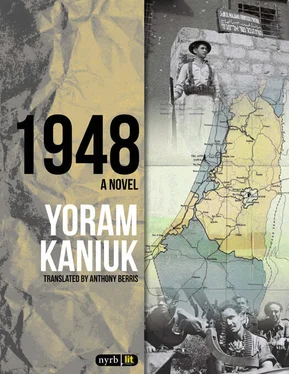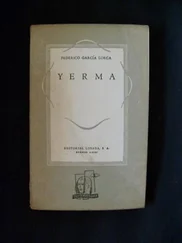One of the kibbutzniks bought provisions from Hamashbir and said he’d seen seven cars parked in a field by the Hadera bus station, and Ari-nom-de-plume said, It’s because they sow them, and with a drop of rain and dung they’ll grow into a forest.
One afternoon all the instructors vanished — perhaps they’d been called out on an operation — and we did as we pleased, we played cards, and the senior intake passed the culture hour by blowing out candles with farts. I went to the sand dunes with Ari-nom-de-plume and we sat there among the thorny bushes. Suddenly Ari-nom-de-plume punched a rock and yelled something, I didn’t understand what, his words were confused, and then in a soft voice he started to tell me about his mother and father, how they had no money to bury his father, and how once, before he went back to portering and died, he’d started bringing girls home. Then he bought a Harley-Davidson to do the haulage, and had been killed when driving behind a truck and the motorcycle overturned. The girls snatched the money, jumped off, and fled, and he remained dead on his own, and Ari-nom-de-plume was taken to identify him and he told me that he looked like a meat patty.
He laughed and then said, I was only kidding, you mama’s boy, your dad’s sweetie, with his pipe and the Germans on his gramophone. He wanted me to know, and then we suddenly saw — blurred at first by the flying sand, and then much more clearly — a young man with a burned face walking in the sand, his hair ash, a basket in his hand. As we moved closer to him we saw there was a human head in it.
Ari-nom-de-plume said, You see? That’s what my father looked like, Hello Dad, and he gave the saddest laugh I can remember. We spoke to the man with the basket but he was evidently dumb and also couldn’t hear. The head in the basket was ugly but it also had a kind of deep beauty like the head of Jesus in the altarpiece by Matthias Grünewald in Colmar, a work my father loved. The man tried to speak, his mouth gaped. He seemed horror-stricken. The words would not come and he fell. Ari-nom-de-plume ran back to the camp, and I sat staring at the two heads because the man with the basket also looked like a dead man and blood flowed from his mouth. Ari-nom-de-plume brought an officer I didn’t know, maybe he was just visiting, a short guy who seemed determined and gave the impression that he knew who the man was and what to do. He examined him and said, He’s dead! I said, But there aren’t any signs of violence. He was silent and checked the man’s clothes, I searched with him and there were no documents on him. The officer checked his private parts and discovered that his genitals were mutilated. He looked here and there and told us not to move. He went off. We waited. Ari-nom-de-plume and I sat there and smoked. It was cold. The officer, who suddenly had a name, Kuti, returned about an hour later. Kuti who? He said, It doesn’t matter, friend. I’m not your friend. You’re an insolent young pup.
A police jeep from Hadera arrived. They checked out the man. They examined the head. A doctor had come with them. They were looking for something. They seemed worried. They took shovels from the jeep and the four of us had to dig a deep pit where the soil was soft beneath a scar of sand, and we buried the man with the head in the basket. Kuti made us swear we’d seen nothing.
Two days later we heard that Kuti had been wounded and nobody knew which hospital he was in. We didn’t know the names of the policemen who’d been with him. We asked, and in turn we were asked what we had to do with Kuti, and what did we want, and then we realized we had to keep quiet.
Ari-nom-de-plume went to see the young woman kibbutznik, who perhaps really was in love with him. He’d always claimed that they love to submit to him. He talked to her and learned the secret. He invented a story, that Kuti was actually a traitor and evidently wouldn’t be coming back, and that nobody knows who the man we buried was and who the head belonged to.
One day we were told that a woman married to a senior Palmach member was coming to give us a lecture on Y. H. Brenner, the author whose words “Blessed is he who dies in such awareness — with Tel-Hai before his eyes” were inscribed in bold black on a wooden board in the doorway of our hut. The senior intake and the woman from Lehi, who was sometimes rude and at other times tender, said that this lecturer had a son who was killed and that they’d heard the lecture more than once. They said she spoke passionately, went hysterical when she talked about Brenner, and then she smoothed her dress over her ass. One of them said, Yeah, six times. The woman from Lehi suddenly became talkative and said she smoothed her dress eight times. Yossi, who was also in that intake and came from Givatayim and knew everybody from Yaffa Yarkoni’s Café Tslil, whose husband was a legendary Haganah commander, said that his friend from Ramat Gan told him that he’d heard her speaking with excitement bordering on hysteria because the dead Brenner was her lover, or so they said, and when she spoke she smoothed her dress over her ass at least ten times.
They started yelling about how many times she smoothes it, and then they decided to take bets on it. It was to be a national wager. Somebody persuaded the kibbutz Haganah commander to let him have his walkie-talkie for a few hours and he contacted all kinds of settlements and kibbutzim, and then the whole course attended the lecture. The woman was surprised by the large number of volunteers who’d come to hear her, since until then she’d spoken to closed eyes. She spoke emotionally about Brenner and his slain comrades and with her right hand smoothed her dress over her ass (I was evidently the only one who heard the lecture, all the rest were busy counting), and she became excited, almost shouting, and her face was red with weeping over the death of that wonderful man, and all around me I could hear excited whispering: One. Two. Three … She smoothed her dress eleven times, and over the walkie-talkie we heard counting and strangled shouts from Ramat Rachel, Ein Harod, Hanita, and excitement was rife.
The officers, who due to the shortage of girls were in love with our female instructors, used the lecture time to make out in the damp sand dunes and didn’t see the great wager. Torrential rain came down again, but who cared. Ari-nom-de-plume was the big winner, of course.
One evening, a few days later, Benny Marshak showed up and gave us an hour-long lecture on the national situation and the war and that we didn’t have any weapons but we’d fight with our bare hands, teeth, fists, bellies, backs, and smite the bitter enemy and conquer the Land of Israel, and we’d triumph, and everybody was tired and fell asleep but Benny was shortsighted and couldn’t see that he was all fired up just for me and two new immigrants, who didn’t know a word of Hebrew but were amazed by his screaming abilities and the belief that squirted from his eyes and his mouth dripping saliva. All the rest woke up and took off to the sand dunes.
Benny got hold of me and said that I’m a cultured boy and that he wants me to organize a Friday-night party. I didn’t know how it was done, I’d had enough of blowing out candles with farts, and anyway, Benny forbade it. Somebody from the senior intake heard me lamenting about what to do for culture, and arranged with Yossi from Givatayim that he bring to the camp two whores from Tel Aviv. The whores were happy to be with Jewish soldiers and he divided them among the guys, and Ari-nom-de-plume did a deal with the guys and collected a penny a bang, and owed me big-time for not saying a word. Afterward everyone sat on boxes and the wrecked boats that were there, and somebody brought a piano, I don’t remember where from, it wasn’t tuned and looked pretty awful, but wonder of wonders, it was a real piano.
Читать дальше












